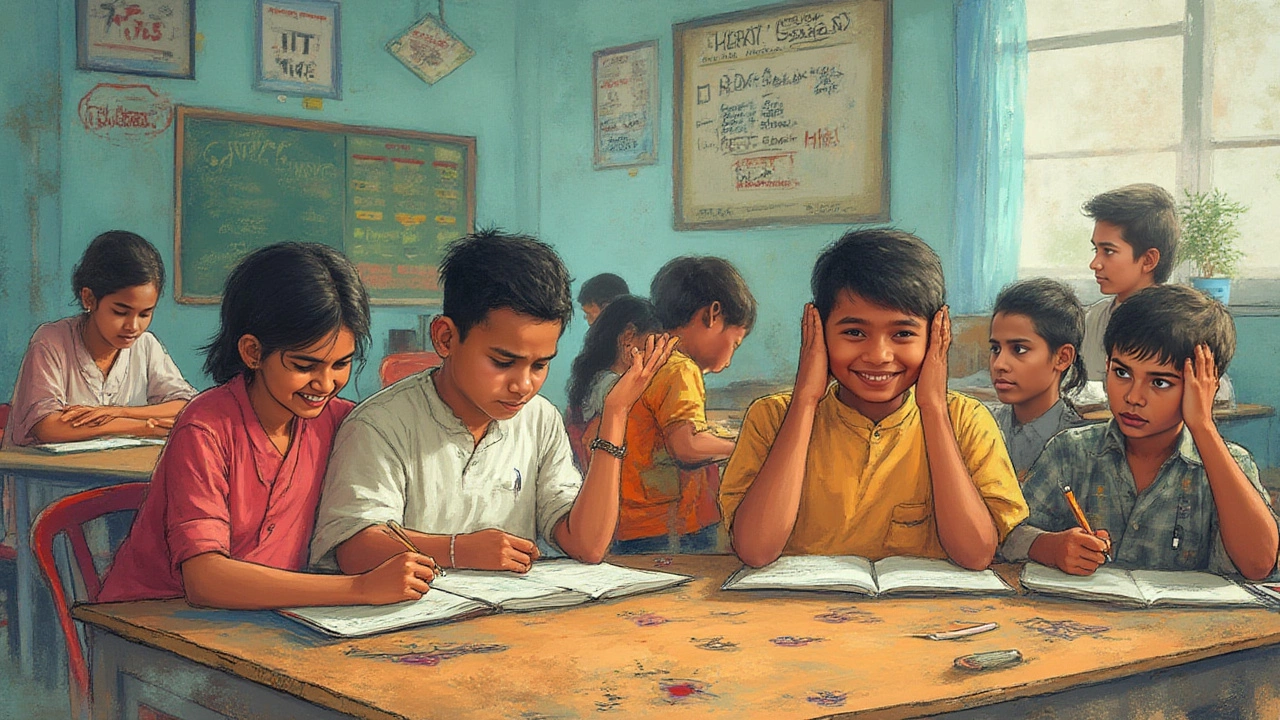Every year, close to a million students stare at the JEE syllabus, wondering if they have what it takes to score an IIT seat. The coaching giants boast posters of toppers and promise shortcuts for hefty fees, making thousands of students (and their families) feel like success is impossible without them. But do you actually need these coaching classes to crack JEE? Are they a lifeline—or just a loud advertisement?
The truth isn’t flashy, but it’s real: Some of the highest JEE ranks have come from kids who never walked into a coaching center. Take Kalpit Veerwal, AIR 1 in JEE Main 2017. He relied on school and self-study, treating the syllabus like a marathon, not a sprint. His name isn’t alone. Every year, headlines surface about aspirants who traded expensive weekly classes for smart resourcefulness. Is it harder without coaching? Sure. Is it impossible? No way. The real difference comes down to strategy, grit, and—believe it or not—a steady approach rather than frantic cramming. If you’re still with me, let’s tackle how and why self-study works for JEE, the hidden traps, and the exact blueprint you can follow if you want to go solo and actually win.
Why Skipping Coaching Might Be Your Best Bet
Coaching centers are big business, and they spend crores in marketing—not only to attract JEE toppers, but to convince you that their notes and weekday tests are the secret sauce. Yet, data tells a story that cracks open a few myths. According to a report published by The Indian Express in 2023, nearly 35% of students who made it to the JEE Advanced rank list had not attended any mainstream coaching. In small towns, that figure jumps to nearly 50%. Many of these students relied on NCERT books, online lecture videos, and a solid study schedule. What set them apart was their ability to stick to a plan and not get distracted by trends. Instead of racing through endless test series, they kept revising core concepts and worked their weaknesses until they turned into strengths.
Beyond the numbers, there’s another edge: self-study builds accountability. If you’re used to instant teacher reminders, you might find the solo route hard at first. But, stick long enough, and you build habits that last past JEE—that’s a game-changer not just for this exam, but for anything tough ahead. Here’s something seasoned educators repeat: “You need only two things for JEE—clarity of concept and relentless revision.” Coaching may help with structure, but it can’t force understanding or self-motivation. When deadlines come from within, you’re not only beating the exam, you’re beating procrastination.
Of course, solo prep isn’t perfect. It can get lonely, and the lack of peer competition could slow your growth unless you consciously seek out quizzes and mock tests online. The good news? The internet is flooded with free resources. NTA’s official site, YouTube, and open forums like Physics Galaxy or Vedantu cover every topic, every question pattern, and every doubt—many for zero rupees. This is the golden age for self-learners: pick and choose your teachers, rewind explanations multiple times, and get instant personalized answers on doubt-solving apps. Money isn’t a wall anymore; presence of discipline and smart time management is.

How to Plan and Execute Solo JEE Preparation
If you’re planning to go the self-study way, the first weapon you need is a strategy. The JEE syllabus is huge, and it’s easy to get lost if you just wander from topic to topic. So here’s what works straight from the toppers’ playbook:
- Map Out the Syllabus: Start with the official JEE Main and Advanced syllabus. Print it out and stick it where you can see it every day. Cross topics as you finish them.
- Curate Your Material: NCERT books are your best friends, especially for Chemistry. For Physics and Math, go for standard texts like H.C. Verma, I.E. Irodov, and Cengage.
- Make Revision King: No matter how fast you go, keep weekly slots for revision. Without it, you’ll forget 80% of what you learn in a month (yes, there’s a study on this—it’s called the “Forgetting Curve”).
- Be Ruthless With Practice: Solve previous years’ JEE papers; it’s the closest you get to the real thing. Analyze mistakes more than correct answers.
- Join Peer Forums: Find free/low-cost Telegram groups, Reddit threads, Discords—where others post doubts, tips, and test questions. It keeps you sharp and competitive.
- Track Your Progress: Use a diary, spreadsheet, or one of the free online trackers. Every small win adds up.
Let’s talk numbers for a second. Most toppers report putting in between 5 and 7 hours a day, but what matters more is “quality hours.” A focused 3-hour session where you solve hard questions and learn from mistakes is better than 8 hours of distracted note-taking. When you get stuck, don’t stew—instead, hunt for a video explainer or ask online. Everyone hits rough patches, from integration nightmares to organic chemistry confusion. The real secret is bouncing back. Make mistakes your teachers. Remember what Dr. Anand Kumar, the founder of Super 30 (a group with dozens of IIT selections annually), says:
“Persistence and hunger for learning matter a lot more than the number of rupees paid to any institute.”
One major hiccup is mock tests. While coaching centers run regular tests, you can mimic the same at home. The NTA’s Abhyas app, Arihant’s test series booklets, or even free practice portals release nearly identical mock papers. Don’t just solve them—post-mortem every answer, especially the wrong ones. Chart out why you made each error and set micro-goals (“fix this Physics concept in 3 days”). Tracking real progress boosts your confidence where it counts—in the exam hall.
| Prep Resource | Type | Cost |
|---|---|---|
| NCERT Textbooks | Books | Usually free or very low |
| H.C. Verma, I.E. Irodov | Books | Rs. 400-550 (each) |
| NTA Abhyas App | App/Mock Tests | Free |
| YouTube (Physics Galaxy/Vedantu) | Videos/Lectures | Free |
| Free Doubt Solving Groups | Peer Support | Free |
Lastly, take care of your body and mind. JEE is a marathon, not a quick sprint. Regular breaks, exercise, and sleep are non-negotiable. The myth of "studying till you drop" is outdated; the fresher you are, the smarter you’ll tackle complex problems. Mental burnout is the enemy of retention and performance. Treat yourself like an athlete prepping for a big event—fuel up, rest up, and show up every single day.

Stories, Pitfalls, and Winning Mindsets: Learning From the Real JEE Toppers
If you want to crack JEE without coaching, nothing inspires like hearing from those who’ve done it. Shubham Srivastava, who secured AIR 1 in JEE Main 2023, prepped in his small UP town with schoolbooks and a borrowed laptop. His daily schedule? Two hours in the early morning, school, then three hours at night. He formed a two-person “study alliance” with a friend, competing to solve Physics questions. Not glamorous, but brutally effective. And he’s not an anomaly. If you dig into open interviews, you’ll discover that almost half the highest rankers never attended the top commercial institutes. They used free government portals, shared books, and stuck to strict timelines. What they had in common was consistency, not magic formulas.
Some real hurdles come up when you prep solo. The biggest? Distractions. Nobody’s monitoring you, so YouTube or WhatsApp can eat up crucial hours. Here’s a tip: Schedule “distraction windows” so you don’t explode from FOMO, but keep them short and guilt-free. If energy dips, rotate subjects (a trick called interleaving learning—proven by educational researchers to increase memory). Another biggie is self-doubt. At some point, every solo aspirant wonders, “Am I missing out without coaching?” The answer: Only if you stop. Every toppers’ interview, whether from Kota or a tiny village, repeats the same mantra—just finish the syllabus, revise again, and you’re already in the top 10%.
Don’t just focus on academics either. IIT interviews and campus surveys confirm that students who learned without spoon-feeding are often more street-smart and resilient. They figure things out, don’t panic during tough questions, and solve problems creatively. Some even report better scores in real-world applications and research, because they spent years figuring things out by themselves. Here’s a fascinating stat: The largest jump in JEE selection rates in the last decade came right after online lectures went mainstream during the COVID-19 lockdown. Suddenly, connections, luxury, or location mattered less—commitment mattered more.
The success recipe? Tough skin, honest self-assessment, and the willingness to ask for help when you get stuck. If you can promise yourself steady, quality daily effort—and stay true to revision—you’ve already done what 90% of candidates never manage. Coaching might help you with pace or competitive spirit, but it’s never been the only way. As one of India’s star solo toppers, Nishita Purohit (JEE Advanced, AIR 70), told a crowd,
"It’s not about coaching, it’s about how badly you want it, and how much you’re willing to fix your mistakes."
The bottom line? Yes, you can absolutely crack IIT JEE without coaching. The path isn’t easy or guaranteed, but the doors are wide open for smart, determined, and self-driven students. With the right mix of planning, practice, resources, and mental strength, your JEE dream can be as real as any coaching-bred topper’s name on the list. Don’t let anyone—especially the big ads—convince you otherwise.
